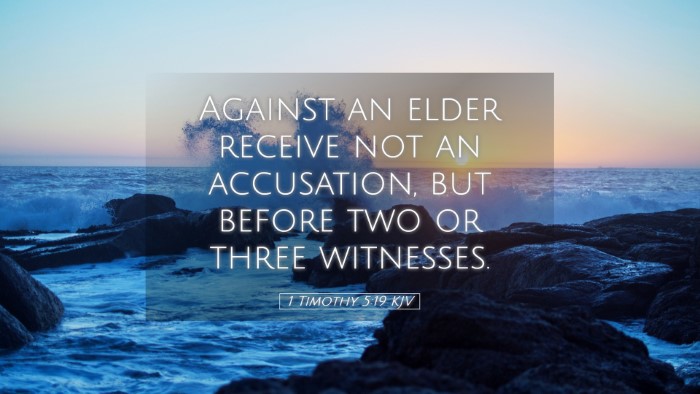Commentary on 1 Timothy 5:19
Verse: "Against an elder receive not an accusation, but before two or three witnesses."
Introduction
In this exhortation to Timothy, the Apostle Paul provides an essential guideline regarding the treatment of elders within the church. The verse emphasizes the importance of reputation, integrity, and the proper procedures necessary for admonishing leaders in the faith community. This commentary collates insights from various public domain sources to provide a comprehensive understanding of this scripture.
Understanding the Context
Paul's letters, especially to Timothy and Titus, address church order and the qualifications necessary for church leadership. In this context, elders are viewed as spiritual leaders who deserve respect and proper treatment. The context encapsulates guidance on how to support and correct leaders while ensuring that accusations are handled judiciously.
Interpretation of Key Terms
- Accusation: This term refers to claims or charges against an elder. Paul cautions against receiving such accusations hastily or without proper verification.
- Elder: This term denotes a church leader, typically one involved in pastoral care and teaching. Elders hold significant responsibility and, by extension, must be protected from false claims.
- Two or three witnesses: This phrase alludes to the biblical principle of requiring multiple testimonies to validate an accusation, thus ensuring fairness in judgment.
Insights from Matthew Henry
Matthew Henry, in his commentary, underscores the need for careful consideration before accepting accusations against elders. He notes that this principle serves to protect the dignity of church leadership and prevent undue strife within the community. Henry remarks that “the honor of the office requires it” and stresses the importance of being judicious in judgment, stating that the reward of the faithful is immense when a society of Christians built on unity and love is preserved.
Albert Barnes' Perspective
Albert Barnes emphasizes that the Apostle Paul’s directive serves as a safeguard for church leaders against frivolous or malicious accusations. He articulates that the context of this verse is deeply rooted in the accountability that elders hold and the integrity required of church leadership. Barnes further elaborates that the church should not tolerate accusations made on light grounds, indicating that maintaining a stable and trustworthy leadership is vital for the church’s health.
Adam Clarke's Commentary
Adam Clarke elaborates that this advice is essential to maintain order and respect within the church. He points out that the phrase "against an elder" speaks to the unique relationship between leaders and their congregations, suggesting that elders should be treated with a measure of gentleness and dignity. Clarke also references Old Testament law, which required multiple witnesses for judicial proceedings, indicating that this principle of justice carries profound implications for the church's governance.
Theological Implications
This scripture carries significant theological weight regarding how the church perceives authority and discipline. Proper methods in church governance reaffirm God's hierarchical order and promote respect among believers. Additionally, it emphasizes the character of leaders and their need to uphold a standard reflective of Christ. Recognizing the weight of leadership also invites prayerful consideration and moral accountability among congregations.
Application for Pastors and Leaders
For pastors and church leaders, this verse serves as a reminder of the importance of integrity in leadership. It underscores the necessity of grace and due process in dealing with accusations while fostering an atmosphere of trust and stability among congregants. The verse is a call to maintain the moral standard that elders represent and to ensure that the church community functions under principles of justice, mercy, and love.
Conclusion
1 Timothy 5:19 provides essential guidelines on how to conduct church governance concerning elders. Drawing from public domain commentaries, this analysis highlights the need for respect, procedural caution, and the guarding of leaders' reputations. For theologians, students, and pastors, these reflections serve as vital reminders of the responsibility inherent in leadership, the need for evaluation of accusations, and the central focus of unity and love within the body of Christ.


